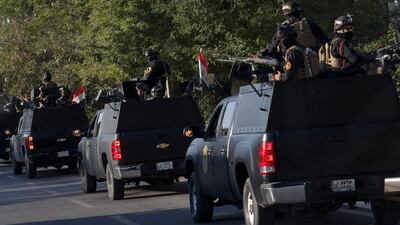A senior Iraqi intelligence officer was shot dead in Baghdad on Sunday, in a grim reminder of the brazen assassinations that plagued the country in the past.
Lt Col Mahmoud Laith Hussein was walking outside his brother-in-law's house in the western neighbourhood of Mansour, just after sunset, when he was shot by a gunman carrying a pistol fitted with a silencer, a statement from the Iraqi National Intelligence Service said.
Security camera footage showed a man wearing a white cap run up to Hussein from behind and kick his leg to drop him to the ground. The gunman then shot the intelligence officer in the head, before fleeing.
Hussein worked at the Intelligence Service Counter-Espionage Department, the statement added.
Iraqi authorities have launched an investigation.
The brazen manner in which the assailant carried out the assassination in one of Baghdad’s busiest commercial and residential areas has raised questions.
"This is first time in years to have a senior intelligence officer killed this way," a member of the agency told The National.
"We used to see such attacks during 2003-2006 when many of Baghdad's areas were under the control of the militants, but at this time and in this way indicates that the intelligence services have entered a political game," he said.
The intelligence service has been heavily involved in recent months in hunting down ISIS extremists in Iraq, especially senior field leaders.
Prime Minister Mustafa Al Kadhimi, a former intelligence chief, ordered a shake-up of the service in January, after a double suicide bombing in Baghdad that killed dozens was claimed by the extremist group.
That move was seen as purging the service of Iran-linked officers.
Iraq's Iran-backed militias have accused some intelligence officers of co-operating with the US in the killing of Maj Gen Qassem Suleimani, commander of Iran's Islamic Revolutionary Guard Corps' Quds Force, in January 2020.
Senior Iraqi militia leader Abu Mahdi Al Muhandis was also killed in the drone strike outside Baghdad International Airport.
The militias accuse Mr Al Kadhimi of allowing foreign influence in the intelligence service.
"There is an open fight between the Iran-backed and US-backed camps, with the intelligence service at its heart," a member of the Iraqi Parliament's Security Committee told The National.
“Since taking office in May last year, Al Kadhimi has heavily relied on the Intelligence Service and Counter-Terrorism Services because he trusts them a lot and they are not infiltrated by Iran proxies,” said the MP, who asked not to be identified because of the sensitivity of the topic.
Mr Al Kadhimi has tried to rein in the influence of the Iran-backed militias but failed. In one incident, the Counter-Terrorism Service arrested 14 militiamen for planning a rocket attack on Baghdad's Green Zone, but they were released days later and the case against them dropped.
But he has taken small but important steps to restrict their money-making activities at airports, ports and through government payroll scams.
Mr Al Kadhimi "is purging Iran-backed militias from Iraq's intelligence services from top down, starting with leaders, and then to ports, airports and borders," said Michael Knights, a fellow at the Washington Institute think tank.
"A killing like this proves that the militias are afraid of the growing strength of the Iraqi security forces under Al Kadhimi," he told The National.
High-profile assassinations and bomb attacks, once common in Iraq, have been rare since Iraqi security forces and US troops launched military operations in early 2008.


